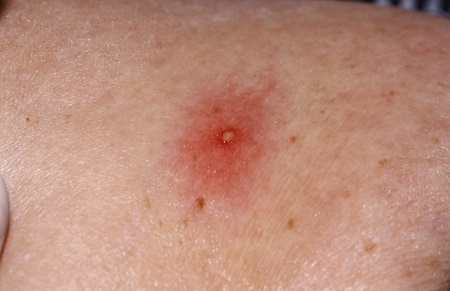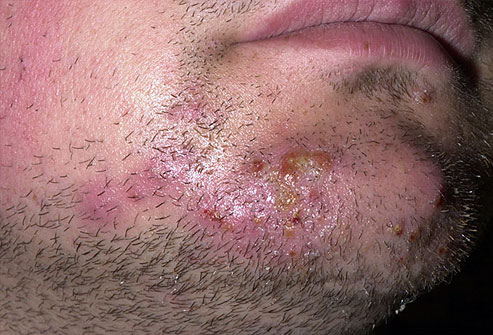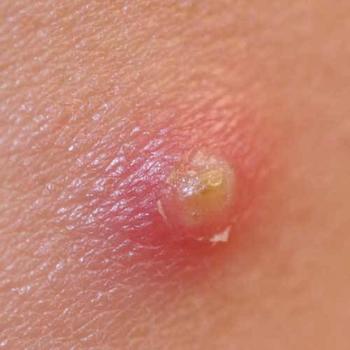Folliculitis is a common skin condition that can affect people of all ages. In this benign condition, you develop small pink or red bumps around hair follicles on your back, chest, legs, arms, cheeks, or buttocks. It sometimes creates small pus bumps and makes you have "chicken skin" appearance on the skin. While the condition is quite common, many people still do not know much about it. One common doubt people have is if folliculitis is contagious. Keep reading to find your answer.
Is Folliculitis Contagious?
It depends what type of folliculitis you have. Most types are not contagious, but you cannot say the same for staphylococcal folliculitis. It may spread by sharing razors, sport equipment, or towels. Direct skin-to-skin contact may also spread folliculitis. Here is more about some of the most contagious folliculitis types.
 Bacterial Folliculitis: Caused by Staphylococcus aureus bacteria, bacterial folliculitis is characterized by white, itchy, pus-filled bumps. You develop it when your hair follicles become infected. Staph bacteria are naturally found on your skin and do not cause problem unless they enter your body through a cut or wound.
Bacterial Folliculitis: Caused by Staphylococcus aureus bacteria, bacterial folliculitis is characterized by white, itchy, pus-filled bumps. You develop it when your hair follicles become infected. Staph bacteria are naturally found on your skin and do not cause problem unless they enter your body through a cut or wound. Barber's Itch: It is the infection caused by Staphylococcus aureus bacteria. It usually affects a man's beard area, which is why they call it "barber's itch". You develop white, itchy, pus-filled lumps when your skin in your beard area becomes infected. You usually get it when you irritate your facial hair while shaving.
Barber's Itch: It is the infection caused by Staphylococcus aureus bacteria. It usually affects a man's beard area, which is why they call it "barber's itch". You develop white, itchy, pus-filled lumps when your skin in your beard area becomes infected. You usually get it when you irritate your facial hair while shaving. Boils and Carbuncles: When staph bacteria cause severe infection, you develop boils and carbuncles. A boil may appear almost immediately after you contract the infection – it appears as a painful red or pink bump. Before long, the bump fills with pus and becomes larger. Eventually, it ruptures and drains. You may end up getting a scar if a large boil ruptures. Sometimes, you develop a cluster of boils, which is called a carbuncle. It usually appears on your shoulders, thighs, or back of the neck. Carbuncles cause a more severe infection as compared to a single boil.
Boils and Carbuncles: When staph bacteria cause severe infection, you develop boils and carbuncles. A boil may appear almost immediately after you contract the infection – it appears as a painful red or pink bump. Before long, the bump fills with pus and becomes larger. Eventually, it ruptures and drains. You may end up getting a scar if a large boil ruptures. Sometimes, you develop a cluster of boils, which is called a carbuncle. It usually appears on your shoulders, thighs, or back of the neck. Carbuncles cause a more severe infection as compared to a single boil.
Who Are More Likely to Get Folliculitis?
Now that you know the answer to your question, "Is folliculitis contagious?" you may also be interested in finding exactly who are at a greater risk of developing this condition.
While any one can get folliculitis, certain factors increase your risk.
- For instance, you may develop folliculitis if you have dermatitis or acne. You are at a greater risk if you have had damaged your skin in the past.
- Being overweight and taking medications such as going for long-term antibiotic therapy or using steroid creams for acne may also increase your risk of developing folliculitis.
- Have a medical condition that weakens your immune system, shaving, soaking in a hot tub, and wearing tight clothing for extended hours may also lead to the development of folliculitis.
How to Prevent Folliculitis from Coming Back
Is folliculitis contagious? Yes, it is. Can you do something to prevent it? Of course, you can. Here are some tips to help you prevent it from happening in the first place and keep it from coming back.
- Do not wear tight clothes to avoid getting folliculitis. It traps sweat and increases friction between clothing and your skin, which may give bacteria a chance to infect hair follicles.
- Be sure to dry out your rubber gloves after regular intervals. Rinse them with water and soap and dry thoroughly before wearing them again.
- Do not shave, if possible. Growing a beard will help solve the problem.
- Always use clean heated pools and hot tubs to ensure you do not become infected. Add chlorine to your pool as recommended to keep it clean.
If you have to shave, take special care when shaving and use an electric razor instead of sharp blade.
- Wash your skin with warm water first and apply some facial cleanser before shaving.
- Also, use lubricating shaving cream at least 10 minutes before shaving to soften your hair.
- Apply moisturizing lotion after you have finished shaving. If you are a bit concerned about barber's itch, be sure to shave in the direction of hair growth.
